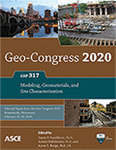Geo-Congress 2020
Piezocone Identification of Organic Clays and Peats
Publication: Geo-Congress 2020: Modeling, Geomaterials, and Site Characterization (GSP 317)
ABSTRACT
A recent study of over 40 organic clay sites subjected to piezocone penetration tests (CPTu) found that the conventional soil behavioral type charts did not identify these materials properly (specifically zone 2), but instead were mostly categorized as either zone 3 (clays) or zone 4 (silts). An alternate CPTu methodology is presented for a more reliable approach to detecting organic clays and peats which mainly requires three parameters: net cone resistance, effective cone resistance, and excess porewater pressures. Once properly identified, a simple expression is used to assess the profile of effective preconsolidation stress in these organic geomaterials in terms of the net cone tip resistance in a power law format.
Get full access to this article
View all available purchase options and get full access to this chapter.
ACKNOWLEDGMENTS
The authors appreciate the financial support provided by ConeTec Group of British Columbia. Thanks are given to Dr. James A. Schneider, USAE, St. Paul, MN for supplying information on the Minnesota site and to Dr. Leon van Paassen of Arizona State University for sharing the data from Toronto.
REFERENCES
Agaiby, S. (2018). Advancements in the interpretation of seismic piezocone tests in clays and other geomaterials. Ph.D. Dissertation, School of Civil & Environmental Engineering, Georgia Institute of Technology, Atlanta, GA USA: 925 pages.
Agaiby, S.S. and Mayne, P.W. (2018). Interpretation of piezocone penetration and dissipation tests in sensitive Leda Clay at Gloucester Test Site. Canadian Geotechnical Journal 55(12): 1781-1794: https://doi.org/10.1139/cgj-2017-0388.
Coutinho, R.Q. and Bello, M.I. (2014). Geotechnical characterization of Suape soft clays, Brazil. Soils and Rocks 37(3), Såo Paulo: 257-276.
Fellenius, B.H. and Eslami, A. (2000). Soil profile interpreted from CPTu data. Proc. Geotechnical Engineering Conf. Year 2000 Geotechnics, Asian Inst.Technology, Bangkok, 18 pages.
Finno, R.J., Gassman, S.L. and Calvello, M. (2000). The NGES at Northwestern University. National Geotechnical Experimentation Sites(GSP 92), ASCE, Reston, VA: 130-159.
Kulhawy, F.H. and Mayne, P.W. (1990). Manual for Estimating Soil Properties for Foundation Design. EPRI Report EL-6800, Electric Power Research Institute, Palo Alto, 306 p.
Long, M. (2008). Design parameters from in situ tests in soft ground. Geotechnical & Geophysical Site Characterization 3, Vol. 1 (Proc. ISC-3, Taipei), Taylor & Francis, London: 90-116.
Lunne, T., Robertson, P.K., and Powell, J.J.M. (1997). Cone Penetration Testing in Geotechnical Practice, EF Spon/CRC Press, London: 352 pages.
Mayne, P.W., Coop, M.R., Springman, S., Huang, A-B., and Zornberg, J. (2009). Geomaterial behavior and testing. Proc. 17thIntl. Conf. Soil Mechanics & Geotechnical Engrg., Vol. 4 (ICSMGE, Alexandria, Egypt), Millpress/IOS Press Rotterdam: 2777-2872.
Mayne, P.W. (2017). Stress history of soils from cone penetration tests. 34th Manual Rocha Lecture, Soils & Rocks, Vol. 40 (3), Sept-Dec., Brazilian Society for Soil Mechanics, Saö Paulo: 203-218. http://www.soilsandrocks.com.br/
Mayne, P.W. and Agaiby, S. (2019). Profiling yield stresses and identification of soft organic clays using piezocone tests, Proceedings XVI Pan American Conference on Soil Mechanics & Geotechnical Engineering, Paper 0149, Cancun, Mexican Society of Geotechnical Engineering (SMIG).
Mayne, P.W., Greig, J. and Agaiby, S. (2018). Evaluating CPTu in sensitive Haney clay using a modified SCE-CSSM solution. Proceedings 71st Canadian Geotechnical Conference: GeoEdmonton, Paper ID No. 279, Canadian Geotechnical Society: www.cgs.ca
Mayne, P.W., Paniagua, P., L'heureux, J-S., Lindgård, A., and Emdal, A. (2019). Analytical CPTu model for sensitive clay at Tiller-Flotten site, Norway. Proc. XVII ECSMGE: Geotechnical Engineering Foundation of the Future, Paper 0153, Reykjavik, Icelandic Geotechnical Society: www.issmge.org.
Mlynarek, Z., Wierzbicki, J., Gogolik, S. and Bogucki, M. (2014). Shear strength and deformation parameters of peat and gyttja from CPTu, SDMT, and VT tests. Proceedings, 5thInternational Workshop on CPTu and DMT in soft clays and organic soils, Poznan, Polish Committee on Geotechnics: 193-209.
Nejaim, P.F., Jannuzzi, G.M.F., and Danziger, F.A.B. (2016). Soil behavior type of the Sarapuí II test site. Geotechnical & Geophysical Site Characterization 5, Gold Coast, Australian Geomechanics Society: 1009-1014. Proceedings available at: www.usucger.org
Reinert, E.T. (2014). Dynamic shake testing of a model levee on peaty organic soil in the Sacramento-San Joaquin Delta, PhD Dissertation, Civil & Environmental Engineering, Univ. California-Los Angeles, 244 pages.
Robertson, P.K. (2009). Interpretation of cone penetration tests - a unified approach. Canadian Geotechnical Journal 46 (11): 1337-1345.
Saftner, D., Mayne, P.W., and Dagger, R. (2018). Cone Penetration Test Design Guide for State Geotechnical Engineers, Report No. 2018-32, Minnesota Dept. of Transportation, St. Paul, MN: 225 p. Available at: http://www.dot.state.mn.us/research/reports/2018/201832.pdf
Schneider, J.A., Hotstream, J.N., Mayne, P.W. and Randolph, M.F. (2012). Comparing CPTU Q-F and Q-Δu2/σvo' soil classification charts. Geotechnique Letters Vol. 2, Issue 4: 209-215.
Zawrzykraj, P., Rydelek, P. and Bąkowska, A. (2017). Geoengineering properties of Eemian peats from central Poland in the light of static cone penetration and dilatometer tests. Engineering Geology 226: 290-300
Information & Authors
Information
Published In
Geo-Congress 2020: Modeling, Geomaterials, and Site Characterization (GSP 317)
Pages: 541 - 549
Editors: James P. Hambleton, Ph.D., Northwestern University, Roman Makhnenko, Ph.D., University of Illinois at Urbana-Champaign, and Aaron S. Budge, Ph.D., Minnesota State University, Mankato
ISBN (Online): 978-0-7844-8280-3
Copyright
© 2020 American Society of Civil Engineers.
History
Published online: Feb 21, 2020
ASCE Technical Topics:
- Chemicals
- Chemistry
- Clays
- Conical bodies
- Design (by type)
- Engineering fundamentals
- Environmental engineering
- Geomechanics
- Geometry
- Geotechnical engineering
- Geotechnical investigation
- Load and resistance factor design
- Load factors
- Material mechanics
- Material properties
- Materials engineering
- Mathematics
- Organic chemicals
- Organic compounds
- Organic matter
- Penetration tests
- Soil dynamics
- Soil mechanics
- Soil pressure
- Soil properties
- Soils (by type)
- Structural design
Authors
Metrics & Citations
Metrics
Citations
Download citation
If you have the appropriate software installed, you can download article citation data to the citation manager of your choice. Simply select your manager software from the list below and click Download.
